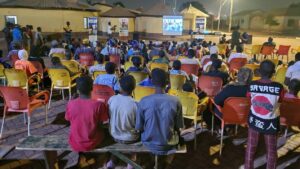IOM sensitises communities on irregular migration
 The International Organisation for Migration (IOM) has organised a community-based sensitisation programme to widen awareness on irregular migration and its consequences.
The International Organisation for Migration (IOM) has organised a community-based sensitisation programme to widen awareness on irregular migration and its consequences.
The programme was in partnership with the Migration Information Centre (MIC) of the Ghana Immigration Service (GIS).
It was undertaken in communities within Tamale, Savelugu and Tolon Districts where the youth were enlightened on dangers associated with irregular migration and encouraged to explore local opportunities.
Community members were mobilised to watch documentaries on irregular migration that captured the struggles irregular migrants encountered.
The programme was under the IOM’s Special Measure Project, funded by the European Union (EU).
Mr Collins Yeboah, Community Outreach Assistant at the IOM, speaking to the Ghana News Agency in Tamale, said the outreach was to highlight potentials within communities that the youth could explore instead of endangering their lives on illegal journeys.
He said the IOM was not against migration, but people must be informed on safe migration and local job opportunities that were accessible.
He noted that feedback from participants of the sensitisation programme indicated that scenes from the documentary would go a long way to positively impact migration decisions of the youth.
Mr Yeboah said: “The impact of the outreach cannot be quantified but qualitatively, assessments show that people are taking the messages to look at opportunities within the country and to travel through safe means.”
Assistant Commissioner of Immigration (ACI), Mr Ibrahim Issaka Lang-hani, Northern Regional Head of Enforcement Unit of the GIS, said the MIC was available to provide migration information to citizens as well as to authenticate travel offers.
He urged members of the public to utilise the services of the centre as well as irregular immigrants to regularise their stay.
He further cautioned against irregular migration stating that the GIS had laws that allowed the prosecution of culprits with fines ranging from 500 to 2000 penalty units, imprisonment of up to five years or both.
Source: GNA
